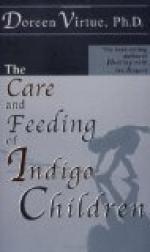If the diarrhoeal attack is more severe, and attended by fever and foul-smelling movements of greater frequency, all milk should be stopped immediately and the diet mentioned just above under the head of acute disturbances of the stomach should be employed.
What changes in the food should be made when the child seems to have very little appetite and yet is not ill?
The number of feedings should be reduced, the interval being lengthened by one hour or even more. No greater mistake can be made than to offer food every hour or two to an infant who is not hungry. Such a course only prolongs and aggravates the disturbance.
What other conditions besides the food greatly Influence the child’s digestion?
Proper clothing, warm feet, regular habits, fresh air, clean bottles, and food given at the proper temperature are all quite as important as the preparation of the food; quiet peaceful surroundings and absence of excitement are also essential to good digestion.
COMMON MISTAKES IN MILK MODIFICATION AND INFANT FEEDING
I. In using modifications made from top-milk, much confusion arises from the notion that top-milk is a single definite thing, whereas its composition depends upon a great variety of conditions and, unless all these are known, it is impossible to tell how strong it is. Directions for the removal of top-milk should be explicitly followed (see page 63), or the results will be very different from those expected.
II. In formulas calling for a certain number of ounces of top-milk of any given strength, the mistake is made of removing only the number of ounces needed for the formula. The proper way is to remove the amount required to secure a top-milk of the desired strength and then to take of this the number of ounces needed in the formula.
III. A rich Jersey milk is used as if it were ordinary milk. The formulas given in this book are chiefly calculated on the basis of a good average milk which contains about 4 per cent fat. Many persons have the idea that the richer the milk, the more rapidly the child will gain in weight, and hence the superiority of such milk for infant feeding. While it is true that some children taking a very rich milk may, for a time, gain rapidly in weight, yet sooner or later, serious disturbances of digestion are nearly always produced.
IV. The food is increased too rapidly, particularly after some disturbance of digestion. If, in an infant three or four months old, an attack of somewhat acute indigestion occurs, the food should seldom be given in full strength before two weeks. The increase in the diet should be made very gradually, the steps being made only one half those indicated in the series of formulas on pages 70 and 71. Otherwise it generally happens that the attack of indigestion is very much prolonged and much loss in weight occurs.




